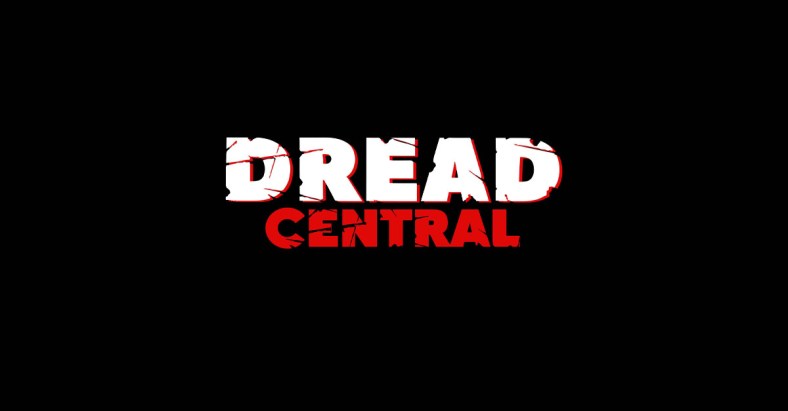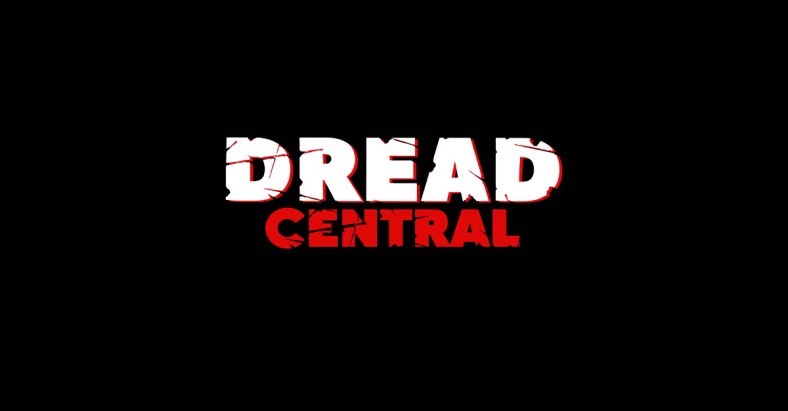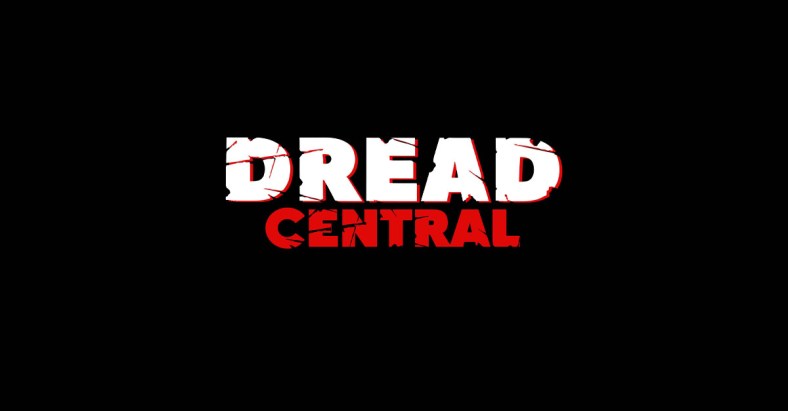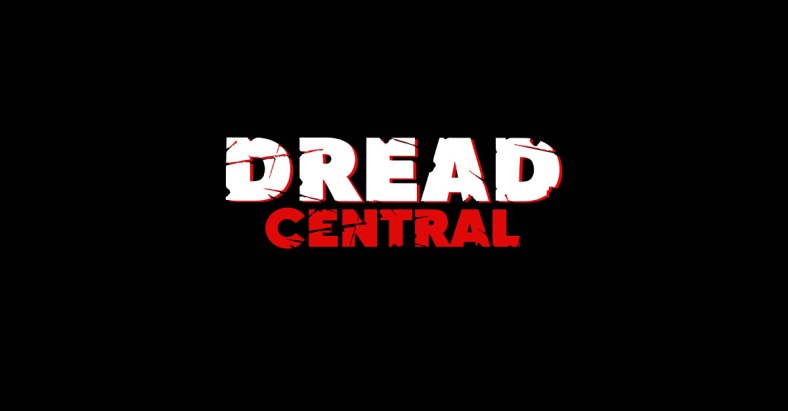Horror Business: Natasha Kermani on IMITATION GIRL and How Relationships Can Make or Break Your First Film

In her first feature, Imitation Girl, director, Natasha Kermani tells a sci-fi story that refreshingly avoids genre cliches and instead presents audiences with a unique and exciting auteurist vision. One of the most fascinating things about Imitation Girl is its tone, which moves in and out of dreamy abstraction while entirely avoiding art house preciousness. Imitation Girl grips you with a hypnotic surrealism that modernly echoes Kubrick and is complemented by the performances of lead actress, Lauren Ashley Carter, who’s pathos as the two main characters is at times, spellbinding.

“When an alien takes the form of an adult film star, both must learn to cope with the complexities of being human in this mesmerizing directorial debut from Natasha Kermani, with Lauren Ashley Carter (Darling) in the dual role of Julianna and the imitation girl.”
The sophistication of Imitation Girl is a very tall order to achieve, particularly for a first feature on a micro-budget, not to mention that Kermani was able to fill the film with scenic landscapes, multiple New York City locations, beautifully rendered CGI, and even Lewis Black! We had to sit down and discuss how she pulled it all off, but before we get into the interview, here are Natasha Kermani’s three key takeaways for aspiring directors.
Natasha Kermani’s Three Keys:
- Build your crew and working relationships ahead of time
- Get experience doing shorts
- Read and reread Kazan on Directing
Dread Central: Hey Natasha, how’s it going?
Natasha Kermani: I’m well, how are you?
DC: Doing great, sorry about all the sirens, I’m in New York right now … You’re from here originally, right?
NK: Yeah, I actually just moved (to LA) about 9 months ago from New York.
DC: How’s that move been treating you?
NK: It’s good! I have been working in LA on and off for about a year so I got acquainted pretty well though I do miss New York a lot.
DC: Let’s talk Imitation Girl, I really enjoyed it and was very captivated by it’s tone. You mentioned on Shock Waves that there were a number of influences on the film, perhaps most notably 2001: A Space Odyssey…
NK: The Kubrick nod is very intentional, but there’s a lot of stuff that gets integrated into the style unconsciously. There’s a lot of early New York stuff in there … I watched Mean Streets a lot before we went into it.
Dread Central: You shot a lot of Imitation Girl here in New York, were you dealing exclusively with permits or were you going guerilla style?
Natasha Kermani: We did everything above the line … Our producers had been shooting in NY so they knew the rules. We were permitted, everyone was paid, there was actually nothing that was 100% free so we tried to play by the rules.
DC: You had your own production company in New York for a while, it sounds like having relationships and a shorthand with a crew was a tremendous leg up when approaching your first feature.
NK: It’s a gamechanger. Not every filmmaker has to go out and start their company from scratch and work for 5 years before making their movie but there is something to be said about not trying to go at it alone and having a team of people that you trust. Shorthand is a perfect word, there’s just an understanding … The company is me and my partners that I met at NYU … we had all been working together and built this company basically off of a bunch of branded content work that we had been doing out of school. When it was time to make this movie we had equipment and crews available to us because we had been working together … It’s a business of relationships, so if people know you, they know you’re good for your promise. It’s really fucking hard to put an independent film together, and if you can jumpstart that relationship, that’s really a huge part of getting it done. I mean, how many films fall apart because of miscommunication or trust issues? Having a system in place, an infrastructure with resources in place is really vital.

DC: What experience helped you the most to prep for Imitation Girl?
NK: Honestly, I don’t think anything can prepare you, it’s crazy. Our approach was a little interesting. We shot the two halves of the film six months apart so it was like approaching it as two really big short films. I think that as a filmmaker, if you have experience doing short films, that’s really really great because a feature is just that on a bigger scale. The learning curve is really in post … because it’s completely different. You’re shooting for two weeks, three weeks, a month, it doesn’t make any difference … you get into a rhythm. But when you’re looking back at the thing and think, ‘oh shit, does this really create a cohesive 90 minute experience?’ that’s something that you don’t do in a short film. So get involved with friends’ projects and go to test screenings, and see how they reshape the thing because post is really a learning curve for a director.
DC: How long did it take from the initial idea to final cut of Imitation Girl?
NK: A really long time … three years.
DC: It’s so easy for people to forget that these things take so long. It took Peter Jackson four years to make Bad Taste, and David Lynch spent 6 years making Eraserhead.
NK: It’s a marathon, that’s the thing about the post production process is how long that is. And that the first time you watch your movie back, it’s really hard because it’s never going to be what you thought it was going to be, it’s always something else, so there’s an adjustment period. It’s like a postpartum period.
DC: It sounds like there’s a certain amount of adaptability that directors need to have with their material where they have to allow it to be moldable as they go forward.
NK: The experience of doing a short film will teach you that, to a degree. I think it’s the same basic idea, just extended in timeline and obviously, intensity. Being adaptable is key, while still holding onto the stuff that is immovable and absolutely needs to stay versus the stuff that can be changeable. It’s a balance, a really tricky balance.
DC: Could you tell me about the initial financing and how you were able to get interest and drum up funds?
NK: We had a few EPs (Executive Producers) to get us started and we shot the first section for a very small amount of money in New Mexico. For that section, we did work with the local film commission and they were amazing, they helped link us up on a lot of locations and got us set up in a really great way, so thank you New Mexico Film Commission!
DC: And that whole first part of Imitation Girl was shot in New Mexico.
NK: That was in Albuquerque … We approached it like a long short film, we shot for 7 or 8 days.
DC: The whole New Mexico section was only shot in 8 days? Whoa, that was like half the movie!
NK: It’s crazy. A lot of it is one location. One location can really make a huge difference. And since that’s all one location, the New York part had to be a lot of locations to balance out because you don’t want to watch a whole movie in one location because that feels cheap and boring. The second half was hard. It was really, really tough to piece that together … We had some more EPs that came on board for the New York portion, after we showed them a 40 minute cut of the New Mexico stuff … It was very piecemeal. It’s like we would take one step then hit pause, collect more money, and then do the next part … We actually had another partner that signed on for post production. So at almost every stage, we had to go back out and beg.

DC: How were you able to find EPs and what was your overall process for getting them?
NK: Almost exclusively our EPs came from people we had worked with before. So again, have your community, have your network … There are those people who are looking to support artists in your community, people who have money set aside in their brains for the arts. Those are the communities you need to tap into in terms of investors, one of them was the comedian Lewis Black.
DC: I was going to ask you, how the hell did Lewis Black end up in the movie!?
NK: Lewis and I had worked on two projects prior … yet again, we had had that relationship for probably 2 years before I even brought the script to him … Lewis is a darling … he’s such a supporter of new voices and he actually helped with a lot of the casting, too. We owe him a lot on this project. Then we had Cup of Joe Film, who are great. They’re a couple in New York who were looking for a project to expand their portfolio. We had a rough cut and we needed finishing funds to get the movie done. We had hit zero, I was completely wiped out. Any money I had, any savings was long gone at this point. They came on and became EPs and covered the rest of it. These people we knew for many years as well because they had been involved with short film projects in the past.
DC: So all this goes back to those 5 really productive years of doing branded video content.
NK: It really does. I know that’s so frustrating for filmmakers to hear, it really is true, they need to know you, they need to know you’re a reliable person, that you are going to get it done, and they have to actually like the thing as well – that’s the other part. They have to believe in the project creatively.
DC: Did you guys do a union shoot?
NK: We were SAG but we were not union … Most projects are going to be SAG Signatory … I mean no disrespect but, most actors that you’re going to want to work with are going to be card holders … Also, and this is a really important thing, there’s a lot of logistics that go into a SAG production that your producing team really needs to be on top of. There’s the paperwork that needs to happen every day, timesheets and that kind of stuff so there’s a lot of research that needs to be done, otherwise you’re going to get some nasty surprises … it’s definitely worth doing your due diligence ahead of time.
DC: Once the film was wrapped, how did you get on the radar of Dread Central?
NK: Sheer luck. We met Shaked Berenson at FrightFest. He asked for a screener of the film to show to Rob (Galluzzo), who is brilliant and amazing and I love him … he liked the movie and wanted to work with us so here we are. It was the festival model, we didn’t have a sales agent or anything like that. We did have a publicist, a really awesome lady named Kaila Hier, she was great, she managed our festivals.

DC: Looking back on the finished film now, what would you have invested more in and what would you have invested less in? I don’t necessarily mean money; it could be money, time, focus, etc.
NK: I really didn’t have a lot of festival connections … my world was really production and putting the movie together and I really wasn’t that preoccupied with sales, and festivals and all that so it’s always good for filmmakers to develop those relationships because these are the people who decide whether or not our movies get seen. You have a product; what are all the ways that your product can get onto a screen? It’s a matter of familiarizing yourself … I kind of learned it as I went … and I’m still figuring it all out. Education in that way is super important.
DC: Do you believe in aliens?
NK: Yeah, absolutely.
DC: Any theories?
NK: I think maybe we are the Seed People from Star Trek … It’s possible that we are the Seed and we are going to go out and adapt and change and get radiated into a different species. We’re also potentially pre-alien, but one way or the other, in some timeline, there are definitely extraterrestrials.
DC: Yeah I just listened to The Last Podcast on the Left episode on The Hudson Valley Sightings, it’s a real treat, especially if you’re a believer.
NK: Oh, I’ll have to listen to that.
DC: Were there any particular books or resources that were helpful for you in your career?
NK: The one I go back to all the time is Elia Kazan’s On Directing … it’s basically a collection of his notes that he would send to his actors or from his own notebook, breaking down the script, his attitude towards it, how he’s interpreting each scene, how the direction is going to work out. That book is just a fountain of information … I also loved Sidney Lumet’s book Making Movies.
DC: What are you favorite full length feature commentaries to watch or rewatch?
NK: There’s a really good one for Seven with David Fincher which is fucking rad.
DC: What scared you as a child that scares you to this day?
NK: Oh my god. Everything. I’m scared of the dark. I am such a baby. My next film is straight horror, it’s was pretty scary writing that. I’ve also had a few really bad acid trips in my time and that’s scary, because you just start seeing things so I think imagination can be scary … I think the idea of absolute evil is the most terrifying thing, Event Horizon really fucked me up as a kid.
DC: What can you tell me about the next movie?
NK: [The Dreadful is] a medieval horror movie, set in England, and it’s sort of a Catholic horror, so there’s demons and hellfire and all that good stuff.
DC: Cool! Last question. Beatles or Stones?
NK: This is unpopular but.. Stones! I know the answer is supposed to be Beatles.
DC: Me too! Natasha, really, really appreciate it. This was a lot of fun.
NK: It was a pleasure! Enjoy New York for me.
Horror Business! is a series that will profile modern horror directors through first-hand accounts of how they got their films from initial idea to the screen. We get into everything from the creative and writing processes to the business sides of producing, funding, shooting, and distributing while distilling the specific techniques, resources, and best practices from those who are making it happen in today’s horror landscape.
Categorized:News

